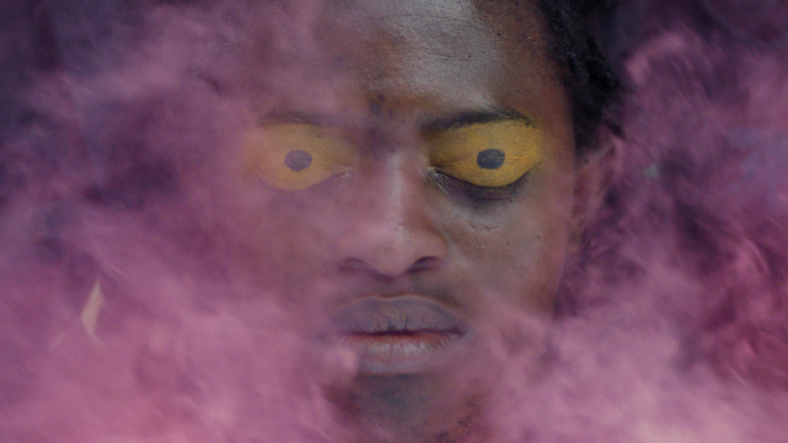‘Omen’ Cannes 2023 Review: A Haunting Portrait Of Grief And the Democratic Republic of Congo

The way grief can fossilize us, the ways it leaves us scrambling in the ruins of our memories for clarity, closure, or peace, have fascinated storytellers since, well, stories started being told. It’s telling that, across cinema’s century-plus lifetime, filmmakers have not yet pinned down exactly what it is about grief that fundamentally reshapes and conditions us. But maybe grasping in the dark is a good thing, because it means we still get curious, inventive movies attempting the emotionally impossible. Omen, the debut feature from Belgian-Congolese rapper Baloji, marks another confident effort mapping out interior worlds against an unforgiving backdrop—here, a story of exile and homecoming in the superstitious Democratic Republic of Congo.
In Omen, which just won the New Voice Prize in the Cannes Film Festival smaller competition strand “Un Certain Regard”, the supernatural offers an imprecise but expansive language with which we attempt to articulate complex emotional worlds. In it, four people are accused of being witches and sorcerers. But witchcraft is less of a practice the characters have extensive knowledge of; rather, it’s a force that pushes its way into everyone’s lives, relishing the fears it conjures up and the biases it confirms. In the film, the accusations often carry more power than the sorcery they’re responding to, as if pointing the finger is a crucial cultural method of making sense of the unexplainable; things aren’t under control until we give it an otherized status in contrast to ourselves.
Also Read: ‘Project Silence’ Cannes 2023 Review: A Predictable Creature Feature
The story is kicked off by Koffi (Marc Zinga) returning to his family in DRC to pay a customary dowry after a lengthy absence. A birthmark across his face has been interpreted as a mark of Zabol—the devil—and after nearly two decades in Europe, resentment has grown amongst his Congolese family members. The suspicion he’s met with is aggravated by his white, pregnant Belgian wife and a nosebleed he drips onto a relative’s baby. Soon, a wooden devil’s head is fastened over his own, and his family gathers for an exorcism ritual to purge his evil from their home.
It’s after this incident that we get to see the full scope of Baloji’s world, introducing us to his sister Koffi (Eliane Umuhire), whose splintering relationship with a womanizing, STI-prone boyfriend is but one small motivator of her planned emigration to South Africa. Deeper through the story, we understand the pain of their mother Mujila (Rwandan actor Yves-Marina Gnahoua—Bajoli has talked about the significance of casting a Rwandan actress in a movie set in DRC). The presence of Koffi’s father Abel—and eventually the crater he leaves the ensemble with after he passes—pervades the family’s lives, even if Baloji’s insistence on ambiguity hurts Omen’s intended emotional impact.
Also Read: ‘The Curious Case of Natalia Grace’ Review: A Tragic True Crime Documentary Series
The closing sequences with Mujila have the greatest resonance, where the matriarch is forced to move out of her family-owned home and confesses the painful burdens she’s always carried being Abel’s wife. The final scene perfectly captures the false truth offered by superstitious beliefs; they seem like a way out, but they will only keep you trapped. There’s tangible envy in how the matriarch sees her two freer, more mobile children.
Most arresting is the story of Paco (Marcel Otete Kabeya), a street child grieving a sister he couldn’t protect (explained in a stunning, visual riff on “Hansel and Gretel”), and whose gang rivalries may lead to his own ruin. Here, Bajoli’s camera is lively, dynamic, and even though Omen’s other sections feel less electric, the same eye for odd, arresting beauty is evident throughout Koffi, Tshala, and Mujila’s stories.
Calling something witchcraft is a way to exercise control over it, to push out different feelings and desires from an overly constrictive way of life. Baloji’s debut film makes a compelling study of its wounded, searching characters, even if it feels like a contextual understanding of DRC’s societal wounds is necessary to understand the fullest extent of its meanings. Still, there’s nothing wrong with a film asking you to meet it on its level, and it’s hard to deny the power of Baloji’s visuals, ones that worm their way into your mind and linger like the pain felt by our rejected, scorned characters.
Summary
Belgian-Congolese rapper Baloji’s feature film debut is a visual feast that offers a new look at grief and witchcraft.
Categorized:Reviews

